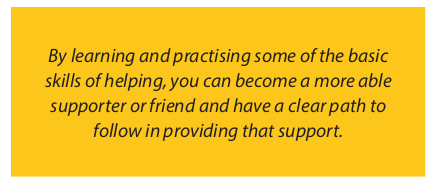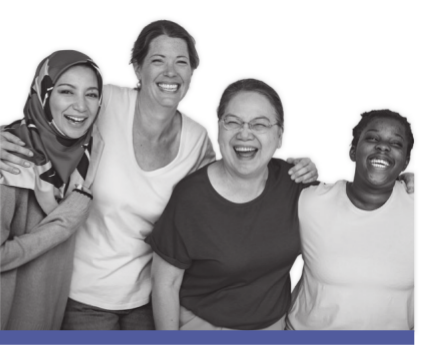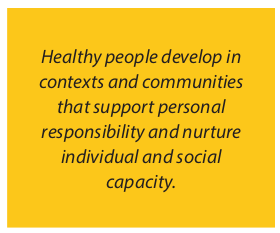A brief guide for friends and family

On this page: |
A health promotion perspective
We are all linked to a larger world that includes our family, friends, schoolmates and coworkers as well as our past and present opportunities and experiences. This larger world influences us and we in turn influence it. Personal and social supports (or lack of supports) impact our opportunities and shape our choices. Our choices, in turn, shape our experiences and influence our opportunities.
Each of us can grow, change, and support well-being, affecting ourselves as individuals, our families and friends, and communities. We all want to feel good, in our minds, bodies, in our relationships with others, and the world. Taking responsibility for ourselves is often not easy, yet, it is a must. Sometimes the stories we tell ourselves about who we are, what we can do or cannot do, and how others see us can get in our way. Reflecting on and reframing our personal stories on a regular basis can help us feel better inside and be better citizens of the world. Each of us can always grow, change, and support the well-being of ourselves, others, and our communities.
When we are concerned about something someone we care about is doing, such as using psychoactive substances, we may wonder not only what we can do, but what is appropriate for us to do given the person's circumstances. Using a health promotion approach, helping someone better understand themselves or make changes is not about telling them how to manage or reduce risks and harms but more about supporting them to increase control over their health. This often involves encouraging them to reflect on their goals, desires, needs, strengths and resources.
All psychoactive or "mind-altering" substances, from caffeine to heroin, involve some risk. For thousands of years, people have been using these substances for their benefits; however, the risk of experiencing short- or long-term harms is always there. Many of us can and do use alcohol, cannabis, prescription medications or other substances in ways that carry minimal risk of harm. Sometimes we start using more, or more often, for a wide variety of personal, social or other reasons. These reasons may feed on each other, leading to a bigger issue with substance use, with a greater risk of harmful consequences to ourselves and others. Generally, when substance use starts to negatively affect a person's relationships, work performance, finances or health, they likely have an issue and may want to think about making some changes.
This guide is aimed at giving you, or any caring person, some basic information, ideas, strategies and resources that can help you understand and support someone who may be at risk of harm from using psychoactive substances. The strategies and techniques discussed here are not confined to the area of substance use.
A supportive path
Each of us has the right to live our own life, even if others do not agree with our choices. Managing our health and wellness, including making decisions around substance use, helps us live our lives with authenticity and dignity. Sometimes the stories we tell ourselves about who we are, what we can do or cannot do, and how others see us can get in our way. Reflecting on and reframing our stories with the support of a caring other, can help us feel better inside and be better citizens of the world. Each of us can grow, change, and support the well-being of ourselves, our friends, our families, and our communities.
Promoting well-being is about building capacity in people and communities to support self-management of thoughts, feelings, and behaviours. In this case, self-monitoring of substance use. Increasingly, health professionals and others are associating recovery with a person's ability to manage normal aspects of daily life, whether this involves substance use or not. In this context, supporting involves encouraging people to see themselves as key in any healing or growth process. It means both rejecting ideas of simplistic cures and discouraging people from passive acceptance of "expert" interventions. It means acknowledging that each one of us has a fundamental right and responsibility to manage our life.
For a long time, treatment experts believed that real change in people's lives can only happen after abstinence is achieved. That is, a person must stop drinking or "get off drugs" completely in order to change or improve their lives, or "get themselves together." We now understand that people often need to get their lives together in order to consider no longer using alcohol or other drugs. We also understand that some people may continue to use alcohol and other drugs in ways that others may consider risky but work for that individual. This may even include using an opioid substitute, an opioid, alcohol, or other drugs, on a daily basis.
Any intervention that helps a person deal with the physical, emotional and social harms related to their substance use may be considered supportive, even a form of treatment. Interventions (such as withdrawal management or counselling) are often helpful, but are just one part of a larger, comprehensive response that includes mutual aid and friendly support. While some experts will continue to prefer abstinence as an ultimate goal, a more respectful objective is to help a fellow human take control of their life. A healing path is varied and, for many people, abstinence may not be immediately realistic or desired, or even a goal for some.

According to Carl Rogers, there are three main aspects of providing caring support to another person. They are:
-
Congruence: as much as you are able, being self-aware, genuine, and authentic in your interactions
-
Unconditional positive regard: no matter what, holding the other person in high esteem, wanting what is best for them as they see it
-
Empathy: continuously working to understand the person's thoughts and feelings
Supporting a person involves a commitment to advancing their best interests as they determine those interests to be. The supportive process starts with the assumption that people are experts on themselves, and the acknowledgement that no one can be expected to have the answers for someone else. Helping or supporting someone is not fixing. It is a partnership in which we, as a supporter, are in touch with our own hopes as well as those of the other person. It involves accepting what the other brings to the relationship and respect for the other that makes exploitation much less likely.
Supporting also involves what Rogers called accurate empathy, that is, actively working to understand the other person's "inner world of private personal meanings as if it were your own, but without ever losing the 'as if' quality." This is not about identification with the feelings of the other person or pity for the other person or their situation. It is believing the other person's views are relevant, important and key in addressing any concerns they may have. The opposite of empathy is imposing one's own views on the other person.
Being a supporter is in many ways like being a friend. By learning and practising some of the basic skills of helping, you can become a more able supporter or friend and have a clear path to follow in providing that support.
Supporting another person: Nine tips
-
Your friend or family member, the person you want to support, needs you. Your caring and wisdom can foster a sense of self-worth that will aid the person through their life challenges and beyond.
-
What do you enjoy doing together? Discovering and exploring mutual likes and dislikes can help you better understand each other, building a deeper relationship between you as well as providing support.
-
What interests does the other person have? What do they want out of life? Understanding and supporting their interests and goals shows that you believe in them.
-
Share your life experiences and what you have learned. This can foster discussions that can help them solve issues other than substance use, building the confidence and resilience needed at any stage of life.
-
Life is a learning journey. Time and space are needed to reflect on what we have learned no matter what our age. Allowing space for the person to determine what experiences mean to them fosters a sense of ownership of their life and ability to decide what their next steps might be.
-
We are human and we all make mistakes. Mistakes are opportunities to learn together.
-
The other person will challenge you! This is a natural part of lifelong growth. Engaging them in a mutually respectful way demonstrates you appreciate them, their needs, and their values.
-
Making time to listen shows that you value communication and that their thoughts and concerns matter to you.
-
Being a supportive friend or caring person to someone can be challenging. Engaging in conversation, letting the person know you are doing your best and are interested in their thoughts, demonstrates that you are a person too. Perfection is not required.
The essence of support—caring dialogue, non-directive language
Supporting means relating to the person in a collaborative way, without confrontation and coercion. It involves confirming the person's self-efficacy—building their confidence to face a task and succeed. Instead of fixing or solving things in their life, the emphasis is on assisting the individual to express their feelings, identify their goals and devise plans to reach those goals, if that seems appropriate. The items below reflect this spirit of helping that is about being alongside another person on their journey, through caring conversation between equals—dialogical exchange.
Building a relationship
Every relationship begins with engaging the other person. The process of engaging helps to establish a partnership. Supporting a person to explore their substance use or any other behaviour is not a matter of doing something to the person, like giving medicine. Rather, it is a collaboration between equals. Aspects of both people, and the context and culture in which they interact, can affect the level of connection. Informal chatting can help create a level of comfort; however, the conversation should move to a focus on more personal concerns if it is to be truly supportive. Along the way, attention to several basics is helpful.
Real acceptance of the other person is essential. This does not mean approving the person's behaviour or choices. It means believing the other is valuable simply because they exist and that they have the ability to make changes in their life if they wish to do so. Acceptance is about being respectful and non-judgmental in your approach to talking. It involves trying to understand the person's point of view, expressing concern and acknowledging their experience. Expressing acceptance helps develop trust and protects the person's self-esteem. Acceptance also means commitment to the person's right to self-determination—the freedom to be and to choose. Without such a respectful relationship, it will be difficult for the person to feel good about your discussions.
Effective listening is fundamental. The most powerful force for change is within the individual. Good listening helps a person explore their experiences and reflect on them, thinking about if, when, and how to move forward. Listening also helps avoid the tendency to give advice. Good listening is also active. It shows sincere curiosity and involves reflecting back the meaning the person is communicating in a way that helps the person clarify their thoughts and feelings, and focus on the issues that most concern them.
Affirmation is another essential ingredient. To affirm someone is to accentuate the positive, to acknowledge their worth and autonomy. To affirm is also to support and encourage, and express confidence in the person's ability to manage their life. When offered sincerely, this can generate a positive connection between yourself and the person. People are more likely to trust someone who sees and affirms their strengths, and more willing to attempt change when they feel more confident in their own abilities.
Exploration—Discovering the possibility for change
Most people who want to make a change know reasons to change and, not to change. Other times, people may not know if they want to make a change, and they feel the need to talk to someone about it. Sometimes people get stuck and don't know how to move ahead. A signal that someone wants to explore their thoughts or feelings or perhaps make a change comes in many forms. Some people experience a growing willingness to look at alternative ways of seeing a situation (my partner sees it differently, my friend said maybe I could), examine feelings (I am not sure how I feel, I am mixed up/confused) or consider change (I want to, I can, or I need to). Others express a decision (I will) or identify thoughts or actions, an orientation toward a commitment to change. How can you help them explore their thoughts and feelings around their substance use?
Open questions invite a person to think a bit before responding. They also encourage conversation. Open questions do not often have "right" answers, meaning it is not easy to predict how the person will respond. Closed questions ask for specific information or short answers. Open questions allow the person to explore their thoughts and feelings, and reflect on them. This reflection allows the person to continue their explorations while having you to support them as they go.
Active listening, restating and feeding back your understanding of what the person has said shows you want to understand how the other person sees things. Reframing the person's thoughts and feelings in a slightly different way may help move the conversation forward. It also helps identify what the person means by what they said. Self-motivating statements can help the person find their own reasons to do something. Asking, "What makes you interested in possibly changing…?" can help someone reflect on why they use substances. Paraphrasing answers ensures you understand the person, and helps their thinking on the topic evolve. Affirmations. Acknowledge the other person's contribution to the conversation. For instance, "I really appreciate how seriously you're taking this conversation."
Sharing inconsistencies. Inconsistency is the perception that what someone says or does fails to match their feelings, a value they hold, or goal they wish to achieve. It may be that the person expresses a desire to make a change of some sort, yet they do not make such a change. Observing this inconsistency and feeding it back to them in simple and supportive language can help them see a difference between what they want and what they are doing. For example, the person may express a desire for stable relationships and yet their substance use behaviours are currently damaging their relationships. Asking open questions about this, or drawing attention to it by restating what was said, can support further reflection and promote clarity. This is a more complex skill that may take time to master. Don't feel pressured to use it if you do not feel ready or wish to do so.
Avoid arguments with the person. They may not feel, or be ready to accept, they need to change. This means acknowledging that the person is ultimately the one who will make decisions about their health and well-being. Showing respect for what the person thinks and feels is more helpful than trying to force or convince them. Sometimes you can agree with the person and then reframe the issue in a way that opens up avenues for exploration. For example, if they don't see an issue with their alcohol use yet have difficulty getting to work on time due to sleeping in, you might reframe the issue by asking how they might avoid problems that may arise from arriving late to work too often.
Summarizing the conversation. This consolidates a discussion and helps the person develop a context for potential change. Here, you use two or three sentences to review the main things talked about. If goals or next steps were outlined, this is a great way to ensure that you both understand what happened or are agreed on how to proceed from here.
Ongoing exploration
Change happens when a person wants to change, feels able to change and develops a plan to achieve that change. Any plan must be developed by the person who will be doing the changing, not imposed by an expert. If the person is not ready or interested in making different choices, you can support them by continuing to explore their thoughts and feelings using the techniques discussed above. At some point they may wish to make changes in their life. People often feel most ready to consider change around those who do not pressure them to do so. If and when they are ready to change, they may well seek you out for support to discuss their plans.
Supporting another person to review and consider their life experiences can be a positive experience for both people. A relationship can develop or deepen as conversations take place. Supporting another may also lead us to consider our experiences and where we may wish to make changes in our own lives.
Strategies for a good conversation
-
Natural settings work well for conversations about substance use—for instance, while preparing a meal together, at a restaurant, on a walk or when doing other activities together.
-
Choose a time when you can talk and listen calmly and respectfully—conversations about difficult subjects go much better when everyone is at ease, and free from anxiety.
-
Respectfully end the conversation when all the cues suggest the other person is not willing to talk—forced conversation is not likely to be helpful.
-
Be prepared to reflect on your past experiences and how they may have shaped your thoughts and feelings—this kind of open reflection and sharing where appropriate encourages mutual empathy and helps the other person be reflective about their own experiences.
-
Check in on yourself during the conversation—Do you sound interested in the other person's thoughts and feelings? Does your body convey that you are interested in the conversation? Are you listening at least as much as you are talking?
-
Ask questions that further the conversation and encourage the person to tell you more about what they are thinking and feeling.
-
Make your responses to the person short, to the point, and demonstrate you understand what they are saying. This helps the person stay on track, retaining their train of thought and feeling, and move forward in their exploration.
A word about inclusion

The spirit of helping crosses cultural boundaries. Ways of engaging may differ across cultures, but respectful listening and accurate empathy provide a universal foundation. By recognizing people as experts on themselves, we can avoid the presumption of superiority implicit in many cross-cultural conversations. Cultural competence, when it comes to exploring the potential for change, is less about having a pre-understanding of the other person's culture and more about awareness of the cultural norms of politeness and practices related to negotiating and planning. Cultural communication skills can often be learned in the conversational process when one begins with a deep sense of respect for the other person. If you don't know what the practices are, ask! Most people will be happy to tell you what is normally done within their culture. For example, you might ask how to politely introduce a topic, and carry through on your learning in the conversation. This demonstrates both a deep respect for the person and their cultural practices.
To thrive, people need to belong to, and be an active part of, a community. Healthy communities provide a rich variety of ways to promote connectedness and inclusion. Building relational capacity, the ability to engage in meaningful conversations with each other, is not only about providing opportunity, but also about nurturing skills. A focus on enhancing relationships (e.g., parent-child, child-school, family, neighbourhood, staff-clients, dialogue between various sectors or among faith communities, etc.) builds capacity for health and well-being by embracing the assets of the entire community.
Health promotion in practice
Supporting people who use psychoactive substances begins with a commitment to supporting them to feel in control of their lives. This involves attention to both healthy settings and the health capacity of individuals. Healthy settings are nurtured by careful action that ensures policies and procedures at all levels of responsibility contribute to a well-functioning community. Building a sense of inclusion so that all members of the community (including those who use substances) feel they can contribute in meaningful ways is crucial. Healthy people develop in contexts and communities that support personal responsibility and nurture individual and social capacity.
This guide focuses on nurturing a person's ability to make choices that foster their well-being through supportive dialogue with another person. Such dialogue involves engaging someone in a collaborative conversation aimed at strengthening their understanding of themselves. Exploring thoughts, feelings, and behaviours in an empathic dialogue can help a person consider their choices, think about change, and define healthy boundaries that balance their needs and those of the community.
Policies also play a role in how communities identify and support people who may be at risk of developing problematic substance use patterns. Policies related to early childhood development, for example, can promote resilience. Likewise, policies that reduce isolation and build connectedness can increase social cohesion and foster a sense that we are all part of a community. Community policies can also problems have ready access to a range of supportive services. An in-depth discussion on substance use policy is available in Understanding Substance Use.
Sometimes our stories can get in our way. Reflecting on and perhaps reframing these stories with the support of a caring person, can help us feel better about ourselves and the world. Each of us can grow, change, and support the well-being of ourselves, our friends, our families, and our communities.

Further information
Resources
Further options for learning more about supporting people who use substances and refining your skills as a supporter:
-
You and Substance Use—a workbook with practical information and strategies if you are considering a change in your substance use patterns
-
Substance Use and Young People: A Guide for Families and Their Caring Communities—vignettes from real life family stories, information and strategies on talking with youth about using substances
-
Dialogue information and skills around substance use aimed at school-aged youth
General resources for providing assistance to someone who may be in crisis or is seeking counselling around their substance use:
-
BC 211 connects you to a range of programs and services, including substance use supports, in your community
-
Helplines for Adults in BC. If you need immediate assistance, call 9-1-1, anytime day or night
-
Helplines for Youth in BC. If you or someone you know is in crisis, in the Greater Vancouver area you can call: 604-872-3311
-
Free or low-cost counselling services in BC or in the Greater Victoria area
Sources
Miller, W.R. & Rollnick, S. (2013). Motivational Interviewing: Helping People Change, 3rd ed., New York: Guilford.
Rogers, C.R. (1965). Client-Centered Therapy. New York: Houghton Mifflin.
Stokols, D. (1992). Establishing and maintaining healthy environments: Toward a social ecology of health promotion. American Psychologist, 47(1), 6–22.
About the author

The Canadian Institute for Substance Use Research, formerly CARBC, is a member of the BC Partners for Mental Health and Addictions Information. The institute is dedicated to the study of substance use in support of community-wide efforts aimed at providing all people with access to healthier lives, whether using substances or not. For more, visit www.cisur.ca.
